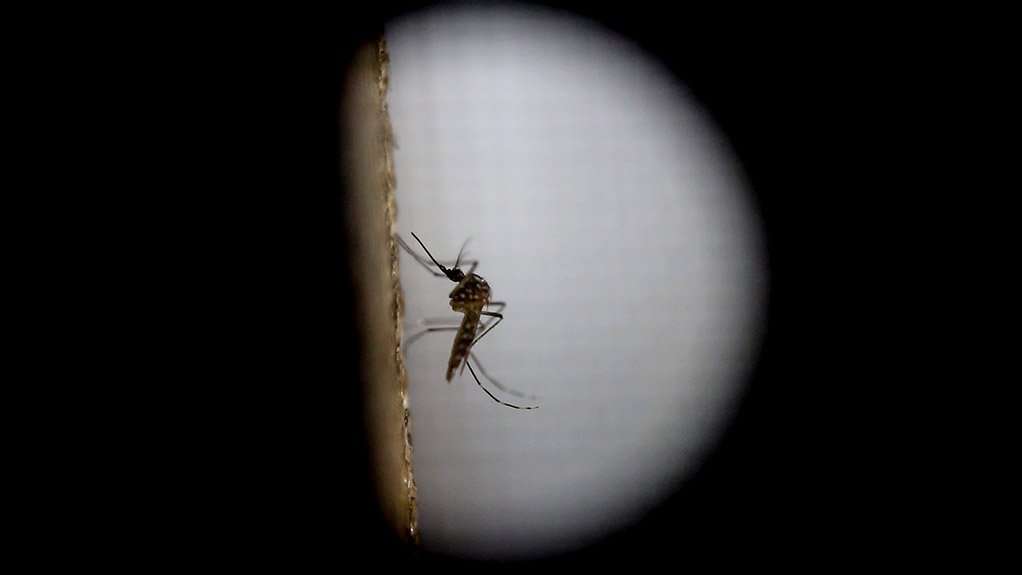New malaria-combat insecticide to infiltrate market by 2017


FIGHTING MALARIA Bayer’s two-way insecticide Fludora Fusion aims to be an effective solution for African disease control programmes to address the challenge of insecticide resistance
Leverkusen-based, multinational life sciences company Bayer expects its Fludora Fusion to be readily available to the African market towards the end of 2017 and early 2018 to combat diseases such as malaria.
Bayer sub-Saharan Africa divisional head for environmental science Jose de Sousa tells Engineering News that, over the years, insects have developed a resistance to insecticides designed to combat vector diseases.
“This has culminated to the formulation of Fludora Fusion, which is based on a combination of clothianidin and deltamethrin for use in indoor residual spray (IRS) applications against vector diseases.”
He explains that clothianidin represents a new mode of action for vector control and is significant because of its ability to combat malaria vectors in areas where there is established or emerging resistance to currently available IRS insecticides.
Moreover, Fludora Fusion also consists of deltamethrin – a neurotoxin that disrupts an insect’s normal nervous system function and kills insects on direct contact depending on their resistance level.
De Sousa notes that to combat vector diseases, it remains important to develop insecticides that can eliminate insects such as mosquitos that transmit diseases.
“Commonly, resistance is management by the rotation of alternative modes of action, but unfortunately, there are only four classes of insecticide recommended by the World Health Organisation (WHO): Class 1– extremely hazardous; Class 2 – highly hazardous; Class 3 – moderately hazardous; and Class 4 – slightly hazardous,” he explains.
Currently, pyrethroid insecticides constitute the majority of commercial household insecticides and are used to treat long-lasting insecticidal bed nets used as protection from mosquitos. However, resistance to this group of insecticides is now widespread and the use of nonpyrethroid insecticides – such as Fludora Fusion for IRS – is gaining interest.
The Germany-based company states that the development of Fludora Fusion began in 2011, and field testing of the product has shown excellent results against many different strains and species of mosquitoes.
Owing to this, the company submitted a dossier in the fourth quarter of last year to the WHO Pesticide Evaluation Scheme (WHOPES) for evaluation and testing of the product, completion of which is expected next year.
The WHOPES evaluation process is a detailed evaluation of the product that entails product physic-chemical specifications, human and environmental risk assessment, product performance, spectrum of efficacy and residual activity through experiments in laboratory and field trials.
According to Bayer, managing the spread of insecticide resistance is a shared responsibility, one which requires what the WHO refers to as a ‘collective strategy’.
Given the current situation with regards to this resistance, any new insecticide must be introduced in a way that gives it the best possible chance of remaining useful for malaria control programmes in the long term.
“Innovation is at the core of Bayer and we have long recognised that new tools for resistance management in malaria vectors are urgently needed,” De Sousa indicates.
He states that the company’s intention with the product is not only to bring a new mode of action and increase the choices for resistance management, but also offer improved cost effectiveness, compared with existing nonpyrethroid solutions.
This should allow for increased coverage and protection for those at risk of contracting malaria, concludes De Sousa.
Article Enquiry
Email Article
Save Article
Feedback
To advertise email advertising@creamermedia.co.za or click here
Press Office
Announcements
What's On
Subscribe to improve your user experience...
Option 1 (equivalent of R125 a month):
Receive a weekly copy of Creamer Media's Engineering News & Mining Weekly magazine
(print copy for those in South Africa and e-magazine for those outside of South Africa)
Receive daily email newsletters
Access to full search results
Access archive of magazine back copies
Access to Projects in Progress
Access to ONE Research Report of your choice in PDF format
Option 2 (equivalent of R375 a month):
All benefits from Option 1
PLUS
Access to Creamer Media's Research Channel Africa for ALL Research Reports, in PDF format, on various industrial and mining sectors
including Electricity; Water; Energy Transition; Hydrogen; Roads, Rail and Ports; Coal; Gold; Platinum; Battery Metals; etc.
Already a subscriber?
Forgotten your password?
Receive weekly copy of Creamer Media's Engineering News & Mining Weekly magazine (print copy for those in South Africa and e-magazine for those outside of South Africa)
➕
Recieve daily email newsletters
➕
Access to full search results
➕
Access archive of magazine back copies
➕
Access to Projects in Progress
➕
Access to ONE Research Report of your choice in PDF format
RESEARCH CHANNEL AFRICA
R4500 (equivalent of R375 a month)
SUBSCRIBEAll benefits from Option 1
➕
Access to Creamer Media's Research Channel Africa for ALL Research Reports on various industrial and mining sectors, in PDF format, including on:
Electricity
➕
Water
➕
Energy Transition
➕
Hydrogen
➕
Roads, Rail and Ports
➕
Coal
➕
Gold
➕
Platinum
➕
Battery Metals
➕
etc.
Receive all benefits from Option 1 or Option 2 delivered to numerous people at your company
➕
Multiple User names and Passwords for simultaneous log-ins
➕
Intranet integration access to all in your organisation



















